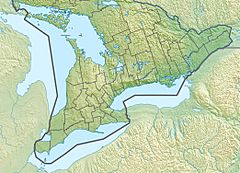Talbot River (Ontario) facts for kids
Quick facts for kids Talbot River |
|
|---|---|
|
Location of the mouth of the Talbot River in southern Ontario
|
|
| Country | Canada |
| Province | Ontario |
| Region | Central Ontario |
| Physical characteristics | |
| Main source | Talbot Lake Kawartha Lakes 262 m (860 ft) 44°41′17″N 78°51′38″W / 44.68806°N 78.86056°W |
| River mouth | Lake Simcoe 219 m (719 ft) 44°28′16″N 79°09′49″W / 44.47111°N 79.16361°W |
| Basin features | |
| River system | Great Lakes Basin |
The Talbot River is a river located in Central Ontario, Canada. It is part of the larger Great Lakes Basin, which means its waters eventually flow into the Great Lakes. The river starts at Talbot Lake and flows into Lake Simcoe.
For part of its journey, the Talbot River acts as a natural border. It separates the township of Ramara to the north from the township of Brock to the south. This border runs from where the river meets Lake Simcoe all the way to the edge of the city of Kawartha Lakes in the east.
Contents
About the Talbot River
The Talbot River is an important waterway in Ontario. It connects several lakes and plays a role in the region's water system. The river helps drain water from both natural and human-made lakes.
Where the River Flows
The Talbot River begins its journey at Talbot Lake. As it flows, it collects water from other lakes. These include the natural lakes, Raven Lake and Talbot Lake itself. It also drains water from two lakes that were created by people: Mitchell Lake and Canal Lake.
Eventually, the Talbot River empties into Lake Simcoe. Lake Simcoe is a large lake in Southern Ontario, and its waters eventually flow into the Great Lakes.
The Trent-Severn Waterway Connection
A part of the Talbot River is now used as a section of the Trent–Severn Waterway. This waterway is a famous system of canals, rivers, and lakes that connects Lake Ontario to Lake Huron. It allows boats to travel across Ontario.
Around the late 1800s, a new, straighter channel was dug for the waterway. This new channel changed how the Talbot River originally flowed into Lake Simcoe. It made the path more direct for boats.
A River's History
Even before the Trent-Severn Waterway was built, the Talbot River was very important. For many years, it served as a key transportation route.
- First Peoples: Indigenous peoples used the river to travel by canoe. It was a vital path for moving between different areas.
- Early Settlers: When European settlers arrived, they also used the river. It helped them move goods and people through the region. The river made it easier to explore and settle the land.
The Talbot River has always been a valuable part of the landscape, helping both nature and people connect across the region.
 | Audre Lorde |
 | John Berry Meachum |
 | Ferdinand Lee Barnett |


